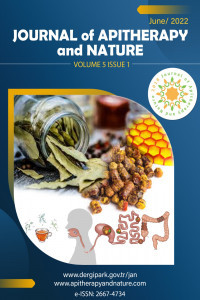Antimicrobial Efficacy of Some Products with Propolis Hydroalcoholic Extract 30% and Antiviral Synthesis
Antimicrobial Efficacy of Some Products with Propolis Hydroalcoholic Extract 30% and Antiviral Synthesis
Antimicrobial Efficacy, Hydroalcoholic Extract, Propolis,
___
- 1. Abbas H., Popescu V.C., Crisan I., Popa M., Chifiriuc M. C., Gradisteanu Pircalabioru G., Lupuliasa D., Farmacia, 2017, Antibacterial Efficiency of five propolis extract on planktonic and adherent microbial strains, Vol. 65, 5: 813-818, ISSN: 0014-8237 (for the Printed Edition) ISSN: 2065-0019 (for the On-Line Edition).
- 2. European Pharmacopoeia 9th ed. (2017), Strasbourg, FR: European Directorate for the Quality of Medicines.
- Yayın Aralığı: Yılda 2 Sayı
- Başlangıç: 2018
- Yayıncı: Oktay YILDIZ
Y. FRIÓN-HERRERA, D. GABBIA, M. CARRARA
Muhammad IQBAL, Tai-ping FAN, David WATSON, Sameah ALENEZI, Muhamad SAHLAN
Chemical Profile of Greek Arbutus unedo Honey – Biological Properties
αrgyrο ANDREOU, Ioanna CHINOU, Konstantia GRAIKOU
Determination of Phenolic Acids in Raw Propolis Using Near Infrared Spectroscopy
Ana María VIVAR-QUINTANA, İsabel REVILLA, María İnmaculada GONZÁLEZ-MARTÍN, Eddy Valentín BETANCES-SALCEDO
Yoga Bee, a New Approach for Health
Chemical Profile and Botanical Origin of Stingless Bee Propolis from Thailand and Indonesia
Hugo ALVES, Catarina PASSÃO, Maria João SOUSA, Cristina Almeida AGUIAR, Ana CUNHA, Rui Pedro OLIVEIRA
The Influence of Propolis on Liver Pathology in Broilers
Maja MISKULIN, Ivana KLARIC, Matija DOMACINOVIC, Berislav PRAKATUR, Albina DUMIC, Daniela Cacic KENJERIC, İvan MISKULIN
Effect of Brazilian Propolis-containing Ointment on Genital Itching in Menopausal Women
Hiroshi MIURA, Yasuko MIURA, Yuki SHIMODA, Satoko KAGABU, Hiromitsu TSUBAKI, Yukihiro TERADA
Hristo PETKOV, Boryana TRUSHEVA, Milena POPOVA, Vassya BANKOVA
